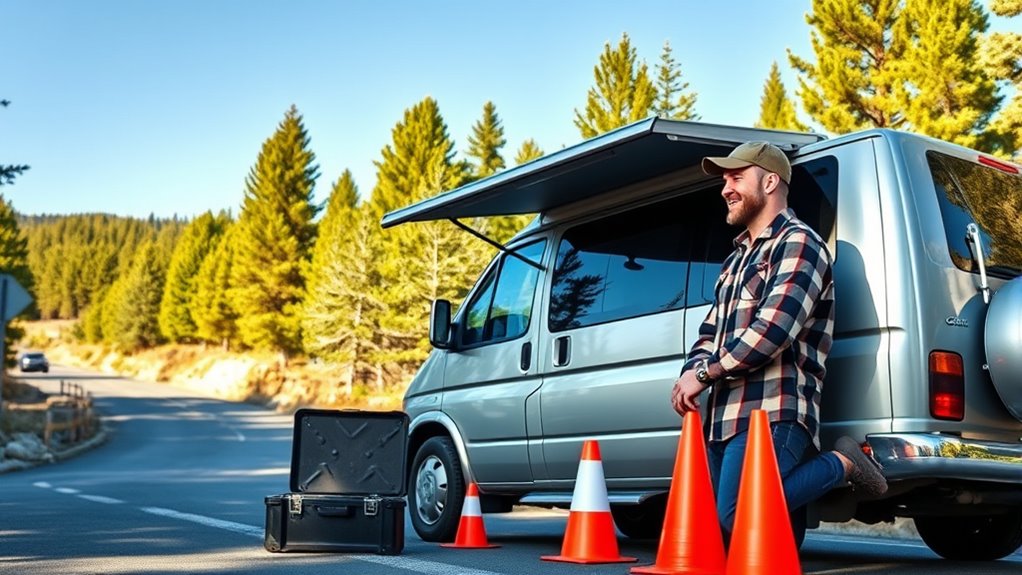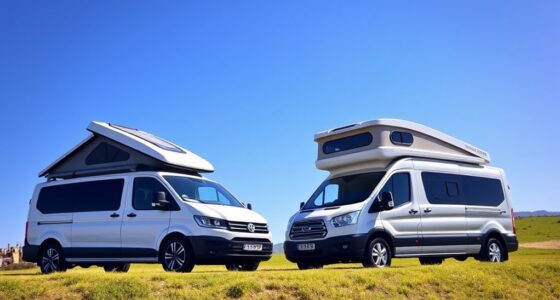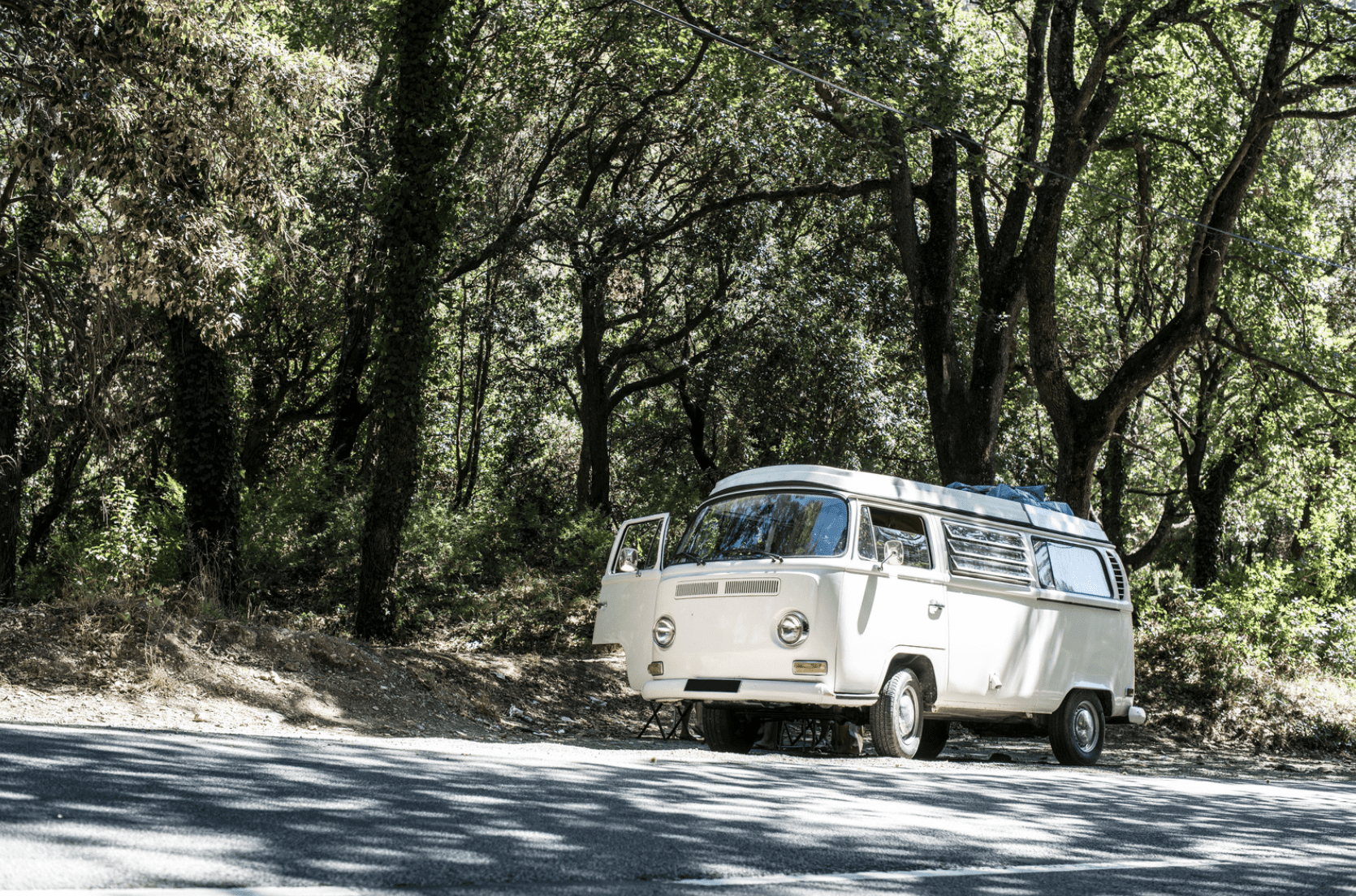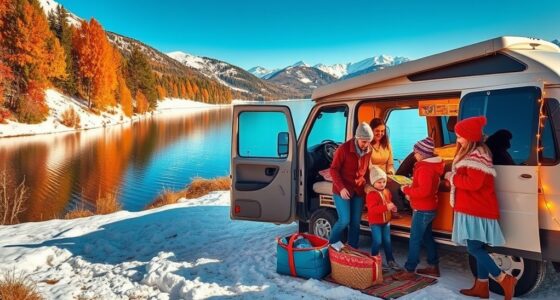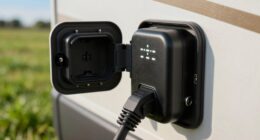To guarantee a safe campervan road trip, start by confirming your insurance covers all essentials and consider roadside assistance. Maintain your vehicle regularly and check features like brakes and tires before departure. Pack a thorough emergency kit and keep emergency contacts handy. Plan your route carefully, stay alert while driving, and take breaks to prevent fatigue. Staying cautious and prepared helps ensure a smooth journey—discover more tips for a trouble-free adventure as you continue your trip.
Key Takeaways
- Regularly inspect and maintain vehicle systems like brakes, tires, lights, and mirrors before departure.
- Ensure your insurance coverage is comprehensive and includes roadside assistance for emergencies.
- Pack a basic emergency kit with first aid supplies, flashlight, bottled water, and snacks.
- Plan routes carefully, considering weather, road conditions, and rest stops; inform someone of your itinerary.
- Drive attentively, follow speed limits, avoid distractions, and take regular breaks to prevent fatigue.
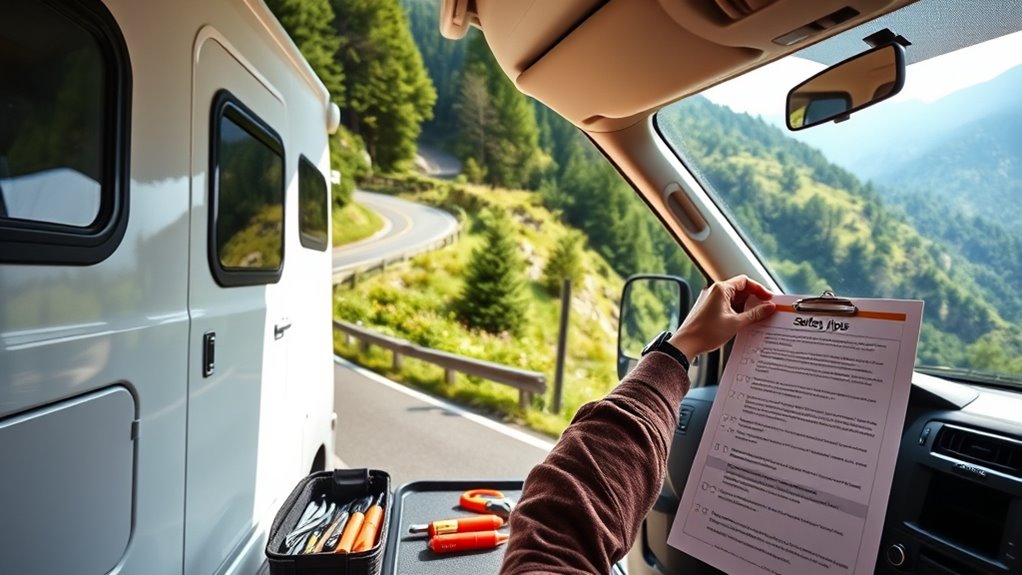
Starting on a campervan road trip can be an exciting adventure, but it’s essential to prioritize safety at every stage. Before hitting the road, you should verify your vehicle insurance is up to date and provides extensive coverage. This isn’t just about meeting legal requirements; it’s about protecting yourself financially if an accident occurs. Review your policy to understand what’s covered and consider adding roadside assistance if it’s not included. Knowing you have solid insurance can bring peace of mind, allowing you to focus on the journey ahead.
Ensure your campervan insurance is current and comprehensive for a worry-free road trip.
Emergency preparedness is equally critical. Prepare a basic emergency kit with essentials like a first aid kit, flashlight, batteries, bottled water, and non-perishable snacks. Familiarize yourself with basic first aid procedures so you can respond confidently if someone is injured. Keep a list of emergency contacts, including local roadside assistance and medical facilities along your route. It’s also wise to have a physical map in case GPS signals are unreliable or your devices run out of power. Having these resources ready ensures you’re not caught off guard in unexpected situations.
In addition to emergency supplies, plan your route carefully. Check the weather forecast and road conditions before setting out, especially if you’re traveling through remote or mountainous areas. Inform a friend or family member about your itinerary and expected arrival times. This way, someone knows where you are in case of an emergency. Also, ensure your campervan’s safety features are functional—brakes, tires, lights, and mirrors should all be in excellent condition. Regular maintenance checks before your trip help prevent breakdowns and accidents. Additionally, understanding your vehicle’s safety features can significantly reduce the risk of injury in case of an incident.
During your trip, stay vigilant while driving. Avoid distractions, adhere to speed limits, and take regular breaks to prevent fatigue. Adjust your driving according to road and weather conditions, and always wear your seatbelt. If you encounter mechanical issues or an accident, having your insurance details accessible will streamline the process of getting assistance or filing claims. Remember, your safety equipment and emergency preparedness aren’t just for accidents; they can help you handle minor incidents or unexpected delays with confidence.
Ultimately, the key to a safe campervan road trip is proactive planning. From verifying your vehicle insurance offers adequate protection to assembling an emergency kit, every step you take prepares you for the unexpected. By staying cautious and well-prepared, you can enjoy your adventure with peace of mind, knowing you’re ready for whatever the road throws your way.
Frequently Asked Questions
What Should I Pack for Emergency Situations During a Campervan Trip?
You should pack a well-stocked first aid kit and a fire extinguisher for emergencies. Include bandages, antiseptic wipes, pain relievers, and any personal medications. A flashlight, extra batteries, and reflective triangles enhance safety at night or in breakdowns. Also, carry basic tools, a spare tire, and emergency blankets. Being prepared ensures you can handle minor injuries or fires, keeping you safe and confident on your campervan adventure.
How Can I Conserve Fuel Efficiency on Long Drives?
To conserve fuel efficiency on long drives, focus on fuel saving techniques and mindful driving habits. Maintain a steady speed, avoid rapid acceleration or braking, and use cruise control when possible. Keep your tires properly inflated and reduce excess weight. Planning routes to avoid traffic and idling can also help. These strategies not only save fuel but also make your trip safer and more enjoyable, ensuring you get the most out of every mile.
Are There Specific Insurance Requirements for Campervan Rentals?
When renting a campervan, you need to guarantee you have adequate campervan insurance and rental coverage. Check if your personal auto insurance covers rental campervans or if the rental company offers additional policies. It’s vital to understand the coverage limits and any exclusions. Being cautious and well-informed helps protect you from unexpected costs and ensures a smooth journey. Always review the insurance details before signing the rental agreement.
How Do I Handle Breakdowns or Mechanical Issues Roadside?
Oh, the irony—your campervan breaks down miles from help. Stay calm and prevent panic. Use your roadside repair kit to troubleshoot minor issues, but don’t hesitate to call for towing assistance if needed. Keep emergency numbers handy, and always have a plan. Roadside mishaps happen, but being prepared guarantees you stay safe and get back on the road quickly. Trust your kit and assistance services—they’re your best friends in an unexpected jam.
What Are the Best Practices for Securing Valuables Inside the Van?
You should prioritize valuable storage and security precautions to safeguard your belongings inside the van. Use lockable compartments or hidden storage areas for your valuables, and avoid leaving them in plain sight. Always lock doors and windows when you’re away, even for a short period. Consider installing security devices like alarm systems or cameras, and keep a low profile to deter potential thieves. Staying cautious helps ensure your valuables stay safe during your trip.
Conclusion
By keeping your campervan well-maintained, staying alert on the road, and planning ahead, you can turn your road trip into a smooth sailing adventure. Think of safety as the sturdy hull of your voyage—keeping everything afloat even when the waters get choppy. Stay cautious, follow these tips, and enjoy the journey with confidence. After all, a safe trip isn’t just about reaching your destination; it’s about making unforgettable memories along the way.

